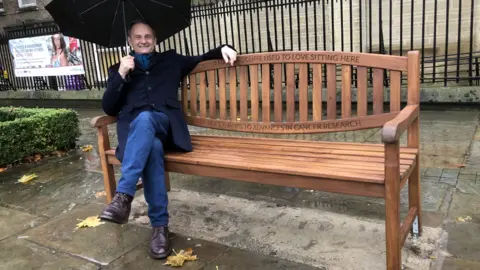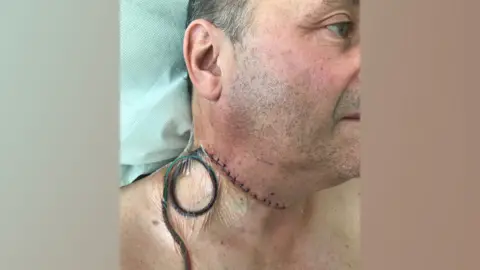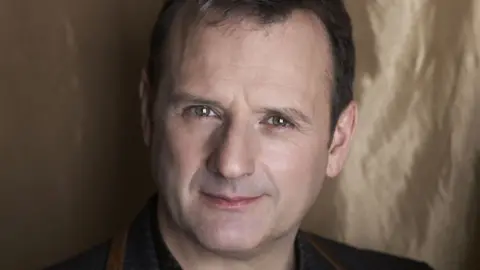BBC Radio 2 DJ Mark Radcliffe says cancer all-clear left him emotional
 North West Cancer Research
North West Cancer ResearchBroadcaster Mark Radcliffe said getting the all-clear from the hospital where he has been treated for cancer for five years was "very emotional".
The DJ said he had been to Manchester's The Christie for "so many appointments" since being diagnosed with cancer of the tongue and lymph nodes in 2018.
He told BBC North West Tonight being "signed off" by doctors and realising "it's all done" was "kind of amazing".
"This was a big part of my life... and we're at the end of that now," he said.
The BBC Radio 2 and BBC Radio 6 Music presenter announced he would be taking a break from broadcasting in October 2018 after he received his diagnosis, before later returning to the airwaves as treatment continued.
He first noticed a lump in his neck while shaving his beard on holiday in Cornwall and consulted his GP straightaway.
Following his diagnosis, he underwent surgery to remove cancerous tumours in his tongue and neck, before being given an intensive course of radiotherapy and two rounds of chemotherapy.

- If you're affected by the issues in this piece, you can find support from BBC Action Line

He said there were some difficult moments during his treatment, but it was not without its moments of levity, such as when he was told he "might not get the same voice back".
"In life, there are really difficult things that we have to face, agonising decisions really," he said.
"And that wasn't one, because if the alternative was dying, frankly, then it doesn't matter if you do another radio show or not ever again.
"In a sense, though it was scary, you just say 'sure, where do I sign?'"
 Mark Radcliffe
Mark RadcliffeHe said returning to The Christie, where he received most of his treatment, to be given the all-clear had made him realise what he had been through.
"I've had so many hospital appointments over the last five years," he said.
"Barely a week goes by that I haven't been to hospital and it was like a part-time job managing my own medical appointments.
"But when I got there and I walked down that corridor, it suddenly came back to me that there were times when I could barely walk through those corridors, I felt so ill.
He said that as a result, going into the hospital "feeling fit and well and knowing that this was the last time, it was a very emotional thing that suddenly came over me like this".
"This was a big part of my life, a series of major adjustments... and that was over and we're at the end of that now," he said.
"I remember coming out early on after my scans and thinking, 'well, this is a different life, isn't it?'
"So five years down the line, to come out... in the sunshine and think it's all done, it's kind of amazing."

He was speaking at the launch of a campaign urging men across North-West England to look out for signs of head and neck cancer.
It comes after newly-released statistics from the National Cancer Registration and Analysis Service showed the region's rates were 20% higher than England as a whole, with more than twice as many men living with the disease than women.
He said men needed to "speak out" and stop thinking "this is nothing and it will go away on its own".
"It might and it might not," he said.
"The most stark thing I can tell you is that [the doctors] said if my cancer hadn't been found, if I hadn't had it checked out when I did... I would have had six to eight months to live.
"That still messes with your head a little bit because it was chance that I found it... but don't let it get to that.
"If anything out of the ordinary strikes you, if you're coughing a lot, if you've got a sore throat a lot, if you any lumps, just go and get it checked out.
"If it's early enough, then people like the amazing people at The Christie, the chances are they will save you."

Why not follow BBC North West on Facebook, Twitter and Instagram? You can also send story ideas to [email protected]
